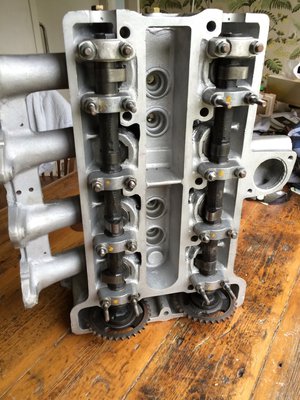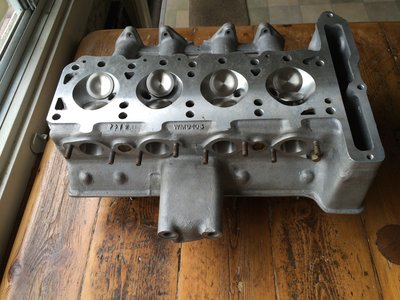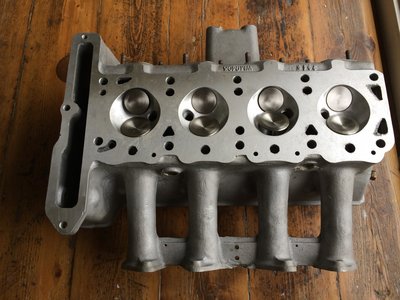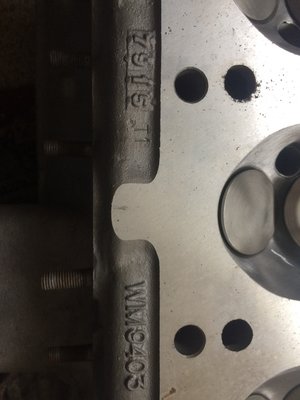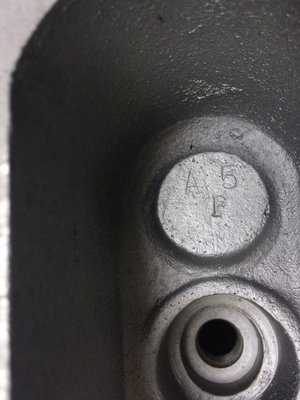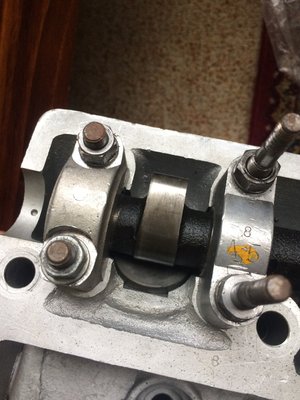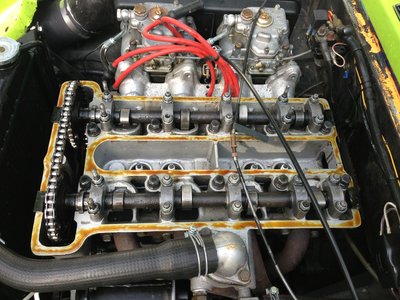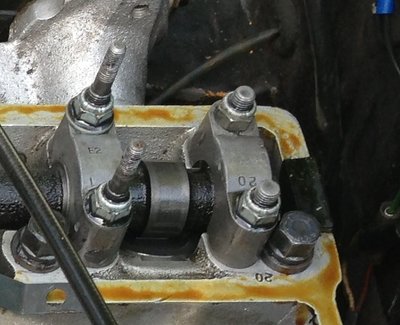Cylinder head identification
12 posts
• Page 1 of 1
Hi Gents,
I was wondering if anyone here could help me identify what type of Lotus this cylinder head in the photos would have originally been fitted to?
Notable things are longer inlets and absence of oil breather box. I am only familiar with Cortina TC heads.
Any information would be greatly appreciated.
I was wondering if anyone here could help me identify what type of Lotus this cylinder head in the photos would have originally been fitted to?
Notable things are longer inlets and absence of oil breather box. I am only familiar with Cortina TC heads.
Any information would be greatly appreciated.
- bsa65
- New-tral
- Posts: 4
- Joined: 27 Oct 2018
Interesting head and looks very similar to the photos of a couple of development heads in the attached article.
These would be from the early 60's and would have been used in race cars probably, as with the long inlets they would not fit in a Cortina or Elan easily. Lotus experimented with various inlet lengths before standardizing on a single length for the production heads that fitted both the Elan and Cortina
Do you know anything about the heads history? Where are you located? If in Melbourne I would be interested in seeing the head to have a closer look.
cheers
Rohan
These would be from the early 60's and would have been used in race cars probably, as with the long inlets they would not fit in a Cortina or Elan easily. Lotus experimented with various inlet lengths before standardizing on a single length for the production heads that fitted both the Elan and Cortina
Do you know anything about the heads history? Where are you located? If in Melbourne I would be interested in seeing the head to have a closer look.
cheers
Rohan
-

rgh0 - Coveted Fifth Gear

- Posts: 8415
- Joined: 22 Sep 2003
HI Mark
Does it have any numbers stamped on the rear face of the head ? Early production heads had an engine number there but that may not be the case with the development heads. Can you take a close up of the numbers on the bottom face also as early heads were stamped there sometimes next to the casting numbers
I would also be interested to see the detail on the rear cam bearing caps and studs This 5th cam bearing was added during development and potentially yours has had the studs added with their detail different from the other 4 caps on each cam similar to the article pictures.
My guess is the head must have come to Australia in the early 60's on a race car it was fitted to, potentially one of the 23B's that came here around that time. Judging by its condition it has not done much work since then and was probably replaced with a production head early on and has sat under someones bench since then.
I get up to Sydney for work reasonably frequently and would be interested in seeing the head if we can arrange a time
cheers
Rohan
Does it have any numbers stamped on the rear face of the head ? Early production heads had an engine number there but that may not be the case with the development heads. Can you take a close up of the numbers on the bottom face also as early heads were stamped there sometimes next to the casting numbers
I would also be interested to see the detail on the rear cam bearing caps and studs This 5th cam bearing was added during development and potentially yours has had the studs added with their detail different from the other 4 caps on each cam similar to the article pictures.
My guess is the head must have come to Australia in the early 60's on a race car it was fitted to, potentially one of the 23B's that came here around that time. Judging by its condition it has not done much work since then and was probably replaced with a production head early on and has sat under someones bench since then.
I get up to Sydney for work reasonably frequently and would be interested in seeing the head if we can arrange a time
cheers
Rohan
-

rgh0 - Coveted Fifth Gear

- Posts: 8415
- Joined: 22 Sep 2003
Hi Rohan,
There a stamping underneath next to cast numbers, I cannot see any other stamping other than ?A5? which is stamped on boss in front of number one spark plug and on every bearing cap except for the rear two.
The rear two bearing caps have no stamping but do appear to have been cast and machined.
I have attached photos.
It does appear to be quite intriguing.
You are welcome to view it when you are in Sydney.
Regards,
Mark
There a stamping underneath next to cast numbers, I cannot see any other stamping other than ?A5? which is stamped on boss in front of number one spark plug and on every bearing cap except for the rear two.
The rear two bearing caps have no stamping but do appear to have been cast and machined.
I have attached photos.
It does appear to be quite intriguing.
You are welcome to view it when you are in Sydney.
Regards,
Mark
- bsa65
- New-tral
- Posts: 4
- Joined: 27 Oct 2018
I wish I could find the book with the reference in it, but I have definitely read about the early development of the TC head, sand cast by William Mills (hence the WM casting number), with long inlet tracts. From memory, the book mentioned that as development of the head continued, the original heads had the inlet tracts cut off with a hacksaw with the carb flanges and the 'velocity drop chamber' for the breather glued on to them to allow development to continue. Later heads were cast with the shorter tracts and chamber included.
This head would appear to be a very early and rare development version. It is the only one I have seen of this type, and may well have been fitted to a race engine.
This head would appear to be a very early and rare development version. It is the only one I have seen of this type, and may well have been fitted to a race engine.
68 Elan S3 HSCC Roadsports spec
71 Elan Sprint (still being restored)
32 Standard 12
Various modern stuff
71 Elan Sprint (still being restored)
32 Standard 12
Various modern stuff
- Andy8421
- Coveted Fifth Gear

- Posts: 1224
- Joined: 27 Mar 2011
It looks like the last bearing caps have been added later when they changed the development heads to have 5 bearings rather than 4. I presume A5 was some sort of identification number for the head and its bearing caps when first assembled.
A nice piece of Lotus History
cheers
Rohan
A nice piece of Lotus History
cheers
Rohan
-

rgh0 - Coveted Fifth Gear

- Posts: 8415
- Joined: 22 Sep 2003
Mark, I have a near identical head I have been trying to trace for 5 years; also:
1. No breather box
2. No half moons on inside of Spark Plug wells (which I believe makes it not an early head)
3. Identical drillings between 2 & 3 intake web....
I've discussed it here, with QED & with Miles Wilkins... still a mystery.
Can't see from your pictures but I also have drillings between the web between #2 & 3 spark plug:
On the back face of the head is the number 9228, it is marked E2 & F on the boss in the Spark plug hole
WM9403 is cast in & there also the same date code 7915. I believe our heads are from the same batch!
The runners have been cut & welded on my head, maybe to shorten them, or maybe done whilst porting?
The head is not original to my car, as it would originally have a Stromberg head.
1. No breather box
2. No half moons on inside of Spark Plug wells (which I believe makes it not an early head)
3. Identical drillings between 2 & 3 intake web....
I've discussed it here, with QED & with Miles Wilkins... still a mystery.
Can't see from your pictures but I also have drillings between the web between #2 & 3 spark plug:
On the back face of the head is the number 9228, it is marked E2 & F on the boss in the Spark plug hole
WM9403 is cast in & there also the same date code 7915. I believe our heads are from the same batch!
The runners have been cut & welded on my head, maybe to shorten them, or maybe done whilst porting?
The head is not original to my car, as it would originally have a Stromberg head.
Phil Harrison
1972 Elan Sprint 0260K
1972 Elan Sprint 0260K
-

pharriso - Coveted Fifth Gear

- Posts: 3186
- Joined: 15 Sep 2010
pharriso wrote:Mark, I have a near identical head I have been trying to trace for 5 years; also:
1. No breather box
2. No half moons on inside of Spark Plug wells (which I believe makes it not an early head)
3. Identical drillings between 2 & 3 intake web....
I've discussed it here, with QED & with Miles Wilkins... still a mystery.
Can't see from your pictures but I also have drillings between the web between #2 & 3 spark plug:
On the back face of the head is the number 9228, it is marked E2 & F on the boss in the Spark plug hole
WM9403 is cast in & there also the same date code 7915. I believe our heads are from the same batch!
The runners have been cut & welded on my head, maybe to shorten them, or maybe done whilst porting?
The head is not original to my car, as it would originally have a Stromberg head.
Hi Phil
It looks like your head is a similar development head from the early 60's race cars. it sound like it was modified to fit an Elan or Cortina by shortening the long inlets. Do your two rear most cam bearing caps differ in any way from the other 8. e.g. different stampings or machining or how they locate on the head as 5th bearing on each cam appears to have been added during the development process at a late stage.
I would have thought St Miles would know something more about these development heads as there must be a few around as I now have pictures of 4 of them including yours??
cheers
Rohan
-

rgh0 - Coveted Fifth Gear

- Posts: 8415
- Joined: 22 Sep 2003
As I understand Lotus had 2 companies casting the prototype / development heads - Birmid and William Mills. There also appear to be at least 4 types of castings used during development from the various photos
1. Long inlet and webs in spark plug well middle and rear (cast by William Mills)
2. Short cast inlet stubs with sockets that could take variable length extensions to the carbs ( maybe cast by Birmid?)
3. Heads with thermostat on inlet side ( maybe early version of Birmid as appear to have variable inlets and no webs in plug well middle and rear?)
4. Head with thermostat on inlet but short bolted manifold in a Cortina and webs in the plug well ( could be from either manufacturer as combines elements from both?/)
all interesting history, maybe the new Lotus Factory museum will explore all of this further or may be classic team Lotus know more about the early race cars using these heads
cheers
Rohan
1. Long inlet and webs in spark plug well middle and rear (cast by William Mills)
2. Short cast inlet stubs with sockets that could take variable length extensions to the carbs ( maybe cast by Birmid?)
3. Heads with thermostat on inlet side ( maybe early version of Birmid as appear to have variable inlets and no webs in plug well middle and rear?)
4. Head with thermostat on inlet but short bolted manifold in a Cortina and webs in the plug well ( could be from either manufacturer as combines elements from both?/)
all interesting history, maybe the new Lotus Factory museum will explore all of this further or may be classic team Lotus know more about the early race cars using these heads
cheers
Rohan
-

rgh0 - Coveted Fifth Gear

- Posts: 8415
- Joined: 22 Sep 2003
rgh0 wrote:Hi Phil
It looks like your head is a similar development head from the early 60's race cars. it sound like it was modified to fit an Elan or Cortina by shortening the long inlets. Do your two rear most cam bearing caps differ in any way from the other 8. e.g. different stampings or machining or how they locate on the head as 5th bearing on each cam appears to have been added during the development process at a late stage.
I would have thought St Miles would know something more about these development heads as there must be a few around as I now have pictures of 4 of them including yours??
cheers
Rohan
There's a minor difference, the front 4 bearing caps on each cam are stamped with a number in order 1 through 8 & each also has a stamping E2 which is also stamped on the boss in the forward spark plug well; this was obviously done to keep the caps with the same head.
The rear most bearing caps do not have the E2 stamping; one is stamped 20 & the other, 56 as is the head near the bearing cap. Again to keep the bearing matched to the head. The metal the 5th bearing cap is mounted to appears cast , not added later.
To me it looks like the front 8 caps were machined / matched in 1 set of machining operations & the back 2 were done as part of a seperate operation on a large batch of heads (56 / 2 = at least 28 heads).
Phil Harrison
1972 Elan Sprint 0260K
1972 Elan Sprint 0260K
-

pharriso - Coveted Fifth Gear

- Posts: 3186
- Joined: 15 Sep 2010
12 posts
• Page 1 of 1
Total Online:
Users browsing this forum: No registered users and 14 guests

